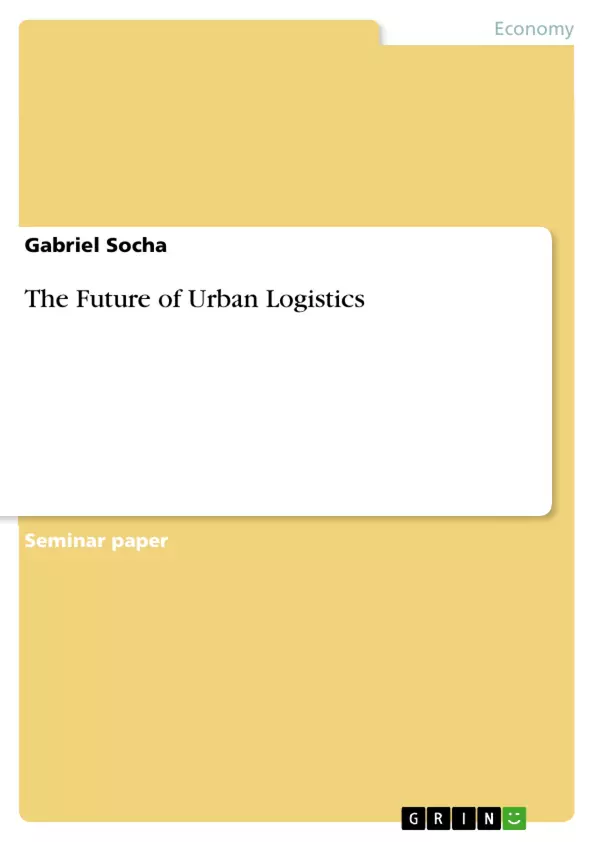This paper deals with a selection of the most important future-oriented questions in the field of urban logistics. It analyzes the relevance of urban logistics, examines transportation types of the future and discusses the impact of demographic change and labor shortage on the logistics market. Further, the concept "Post 4.0" is critically questioned and it is reflected to what extent the fields procurement and production logistics are influenced by the global trends. Lastly, a conclusion summarizes the most important findings and introduces additional research fields.
Urban logistics is a topic of increasing interest to both research and practice. Reasons for this are diverse: Population growth in urban areas is expected to continue, meaning that by 2030, 79% of the German population will live in these areas. This, in turn, has an impact on the already growing e-commerce which is a major driver for parcel delivery. As a result, parcel volume is expected to reach 5 billion pieces per year by 2026, equaling a growth of 100% since 2016. With a growing volume, not only the complexity of routes and business scalability increases, but also environmental problems, which are already the focus of various stakeholders anyway. Thus, logistics companies are required to develop innovative solutions, such as those derived from the possibilities of digitalization, in order to meet the increasing and changing demands of stakeholders.
Inhaltsverzeichnis (Table of Contents)
- Introduction
- Analysis
- Urban logistics - A topic of increasing importance
- Future transportation types
- Impact of demographic changes on urban logistics
- Labor shortage in logistics - Digitalization as a chance
- Critical discussion of the concept “Post 4.0” by Kunze (2016)
- Procurement and production impacted by logistics trends
- Conclusion
Zielsetzung und Themenschwerpunkte (Objectives and Key Themes)
This seminar paper aims to analyze the future of urban logistics by exploring the key trends and challenges shaping this evolving field. It focuses on the increasing importance of "last mile" logistics within a context of urbanization, globalization, and digitalization.
- The rising importance of urban logistics and its drivers
- The impact of demographic change and labor shortages on the logistics industry
- The role of digitalization and innovative solutions in addressing urban logistics challenges
- The influence of logistics trends on procurement and production processes
- A critical analysis of the "Post 4.0" concept in relation to urban logistics
Zusammenfassung der Kapitel (Chapter Summaries)
- Introduction: This chapter introduces the growing importance of urban logistics, highlighting the trends of urbanization and e-commerce growth as key drivers. It emphasizes the need for innovative solutions to address evolving demands in this field.
- Analysis: This chapter explores various aspects of urban logistics, examining the perspectives of key stakeholders, including public authorities, customers, retailers, and transporters. It discusses the impact of demographic changes, labor shortages, and digitalization on the logistics industry. This chapter also presents a critical analysis of the "Post 4.0" concept and its implications for urban logistics. Finally, it analyzes the influence of logistics trends on procurement and production processes.
Schlüsselwörter (Keywords)
The key focus areas of this seminar paper include urban logistics, last mile logistics, e-commerce, urbanization, digitalization, transportation, demographic change, labor shortage, sustainability, procurement, and production. These concepts are discussed in relation to the evolving landscape of urban logistics and the challenges and opportunities presented by the "Post 4.0" concept.
Frequently Asked Questions
Why is urban logistics becoming more important?
Population growth in cities (79% of Germans by 2030) and the rapid expansion of e-commerce are driving a massive increase in parcel volumes and delivery complexity.
What is "Last Mile" logistics?
It refers to the final step of the delivery process from a distribution hub to the end customer, which is often the most expensive and complex part of urban logistics.
How does labor shortage affect the logistics market?
The lack of qualified drivers and workers forces companies to invest in digitalization and innovative transportation types to maintain service levels.
What is the "Post 4.0" concept?
"Post 4.0" (Kunze, 2016) describes the digitalization of postal and parcel services, integrating smart technologies and data to optimize routes and customer interaction.
What are the environmental impacts of urban logistics?
Increasing delivery volumes lead to higher emissions and traffic congestion, requiring logistics companies to develop sustainable and innovative solutions.
- Quote paper
- Gabriel Socha (Author), 2019, The Future of Urban Logistics, Munich, GRIN Verlag, https://www.grin.com/document/466393



